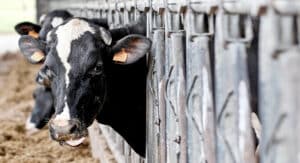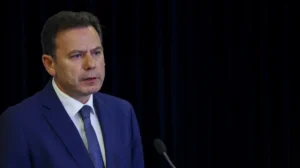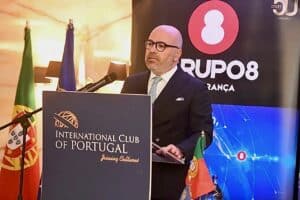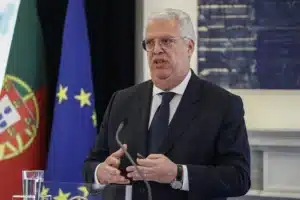“Sometimes, even with great friends, we have differences” – PM
Portugal’s prime minister Luís Montenegro has announced a set of measures this afternoon “totalling more than €10 billion” to respond to the tariffs applied by the United States.
Luís Montenegro was speaking at the press conference following the meeting of the Council of Ministers dedicated to the tariffs applied by the US – some of which have since been suspended for 90-days.
“Portugal is linked to the United States of America by a solid friendship and an intense political and economic relationship (…) But sometimes it has to be said, even with our great friends we have some differences,” he said from his official residence in São Bento.
The PM added that “the absolute priority is to negotiate with the United States” and, in this context, Portugal is completely aligned with the positions taken by the European Commission.
The diversification of markets and the rapid implementation of the agreement already signed between the EU and Mercosur are other priorities defended by the PM, who welcomed the 90-day pause in the toughest ‘reciprocal’ tariffs announced by US President Donald Trump.
In his speech, which lasted around 15 minutes, Mr Montenegro acknowledged that the increase in tariffs “threatens world economic growth and could lead to a trade conflict” which “benefits no-one”.
Regarding the Portuguese situation, the PM recalled that the United States is the 4th largest destination for Portuguese exports, acknowledging that they could be directly affected and that the Portuguese economy “could be affected indirectly”.
“Portugal welcomes the 90-day pause, which shows this is not a time for hasty and reflective statements. We will continue to work with the European Commission and follow the European Union’s negotiations hand-in-hand, but always with the awareness that a pause, this pause, is just that, a pause, and that we have to get our homework done, at home and also on a European scale.”.
Luís Montenegro added that history shows protectionism is not the solution- and that improving trade rules involves dialogue, reforms and effective application of the rules.
“The answer to this trade challenge is two-fold. Firstly, externally, where we coordinate and act at the European level. And internally, where we take national measures to support the most affected sectors,” he said, before Economy Minister Pedro Reis detailed the package of measures.
On both levels, the PM argued, “hasty and impulsive reactions, without rigorous evaluation, only exacerbate the problems”.
“We have been coordinating with the European Commission and our European partners daily for weeks. I have been in frequent telephone contact with the President of the European Commission. And now that we know the effective measures taken by the United States, the European Union is responding appropriately.”
As national media has been reporting over the last week, PS general secretary Pedro Nuno Santos has accused the government of inaction in its response to the US tariffs, saying it should have reacted more quickly.
The measures: these involve €8.6 billion in ‘credit lines’, backed by the Banco do Fomento (Development Bank)
- Reinforced credit insurance
There will also be a €1.2 billion euro reinforcement of the credit insurance ceiling, which will cover not only emerging countries, but also “traditional markets”. According to the executive, there will be a ‘reinforcement of the export credit insurance allocations of the Portuguese Export Credit Agency (ECA), for the search for new markets and the reinforcement of traditional markets’, as well as the ‘start of the integration of the Portuguese Export Credit Agency into the Banco de Fomento’ and the ‘partial subsidisation of export credit insurance premiums for new markets’.
- Greater support for internationalisation
The government also intends to expand projects to support internationalisation, with the reinforcement of “collective programmes” that allow companies to go to more fairs. This measure aims to ‘increase the international presence of SMEs (small and medium sized enterprises) through participation in fairs and international events, and by carrying out prospecting and external marketing actions’, and ‘projects can be developed individually or in conjunction with associative entities’, totalling €150 million euros. The aim is also to ‘strengthen international promotion campaigns and joint prospecting of new markets’, where ‘projects can be developed by associations or public agencies with competences in the area of internationalisation’, with an allocation of €50 million.
- €2.640 million in programmes “brought forward”
According to Pedro Reis, this strategy, dubbed Strengthening Portugal, aims to enable companies to ‘respond to and mitigate’ the impact of tariffs in Portugal and to support the search for new markets for exporters.
The programme will cover exporters based in Portugal, and start in May/ June, with “almost all” measures in place in the next quarter.
Asked whether the plan would continue, even with the 90-day pause in the application of tariffs, Pedro Reis said it was actually ‘accelerated and reinforced’ by this context, but that it corresponds to a ‘design of a strategy’ that the government wants to put in place.
It will therefore be ‘implemented regardless’ of what happens in the negotiations with the European Commission.
All these measures and credit lines have come out of the meetings held between Reis and business leaders and associations. He told reporters “if the government is the father of this programme, the business associations are the mother”. ND
source material: LUSA/ SIC Notícias




















